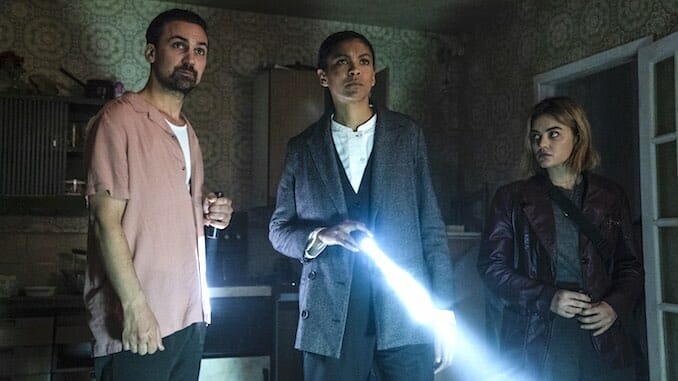Ragdoll: AMC+’s Crime Series Struggles to Blend Gruesome Thrills with British Wit
Photo Courtesy of AMC+
A thawing, patchwork body hangs from the ceiling of a dark, dank apartment. Hand outstretched, it points out the window, across the way to Detective Sergeant Nathan Rose’s (Henry Lloyd-Hughes) flat. It’s immediately clear to DS Rose this is not the coincidence his coworkers believe it may be. The horrific scene is a direct call-out. A threat. A promise.
Ragdoll, a new thriller executive produced by AMC+ and Sid Gentle Films Ltd. (Killing Eve), follows Rose, Detective Inspector Emily Baxter (Thalissa Teixeira), and Detective Constable Lake Edmunds (Lucy Hale) as they track down the person behind the gruesome crime. After the discovery of the Ragdoll corpse—the cheeky nickname given to the amalgamation of six corpses sewn together —the team receives a sinister message from the killer, naming the next six victims. The final name on the list is none other than DS Rose.
Dark and dramatic, Ragdoll feels like it comes directly in the wake of the current cultural obsession with true crime that’s taken over media in the past few years. Documentaries and podcasts recounting graphic murders and sexual assaults flood their respective markets and have made us so desensitized to the true horrors that have been committed, usually against women. Ragdoll, although fully fictional, is paced like these familiar true crime exposés. Each of the three episodes provided for review ends on a reveal and a cliffhanger, begging for the audience to keep watching, even if it feels like it’s happening out of pure necessity and not willful motivation. In a moment of self-awareness, a character prefaces a suggestion with, “Stop me if this is too podcast-y but…” Hale has even said her love of true crime media led her towards this role. For those like myself who see the true crime genre as potentially exploitative depending on the care given to the subject, this connection feels just a bit crass. Ragdoll verges on pulpy and should be watched purely for entertainment; to consume a retelling of true tragedies in the same way as a dramatized series like this diminishes the world-shattering effects whatever story we’re casually listening to on a podcast. Of course, murder and crime have always been a booming genre for film and television, but there’s something unsettling about Ragdoll’s insistence to be included in the true crime conversation. Perhaps that comes from the series’ wavering and inconsistent tone.
In a way similar to Killing Eve, head writer Freddy Syborn tries to tie British wit in with Ragdoll’s serious central investigation. But unlike its predecessor, the humor feels forced and falls flat. Meant to be the American fish out of water, Hale’s character often makes up the brunt of the awkward and not-quite-funny moments, excitedly spitting out over-rehearsed lines like “it’s a thing in Morocco!” and “you’re a Cancer—star sign—you feel everything.” Her Other-ness is inescapable and worked into every part of her character, including her being the only American in the series. She’s concerned with the social politics of the police force, has artsy tattoos, and is a vegan. These facets of her personality are delivered to us so pointedly, it’s hard to see her as someone who could really exist other than as a walking cliche. Comic relief is appreciated and understandable as the detectives are trying to do anything they can to avoid breaking down under the weight of the crimes they’re tasked with investigating, but the execution leaves something to be desired.
-

-

-

-

-

-

-

-

-

-

-

-

-

-

-

-

-

-

-

-

-

-

-

-

-

-

-

-

-

-

-

-

-

-

-

-

-

-

-

-








































